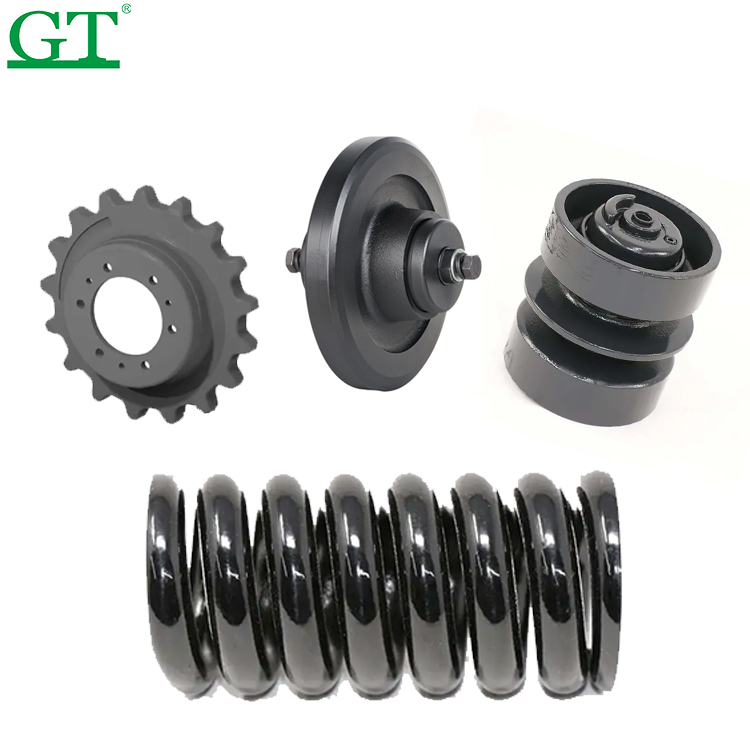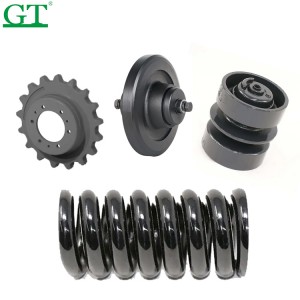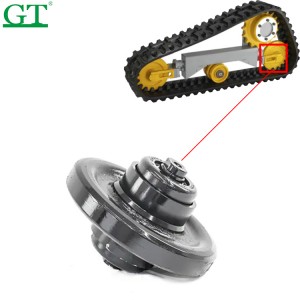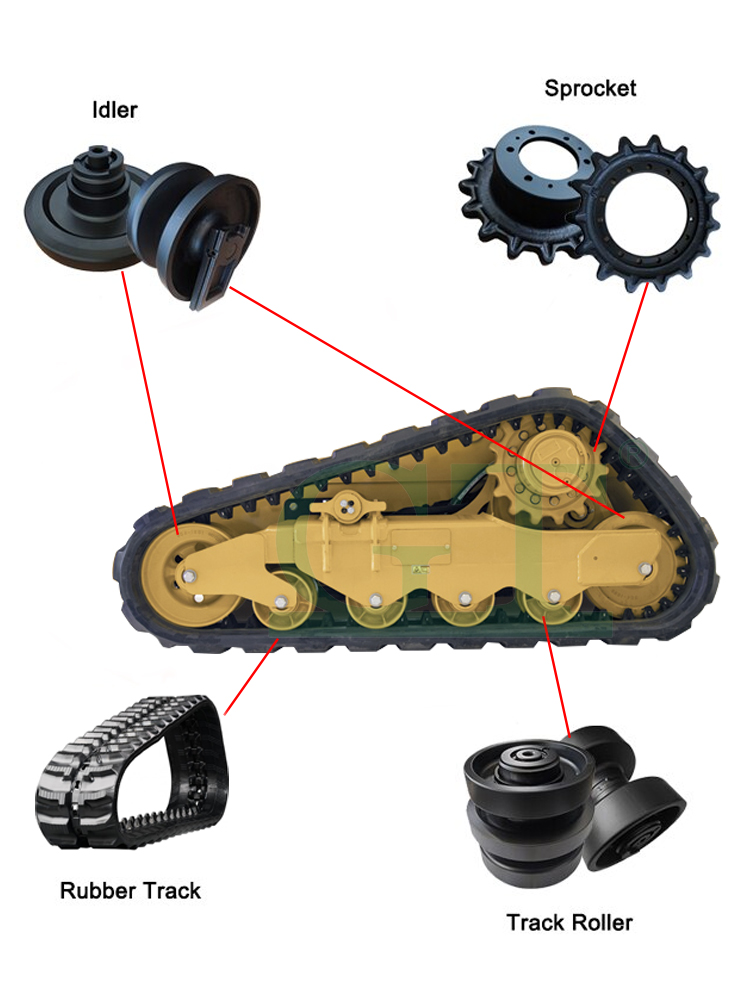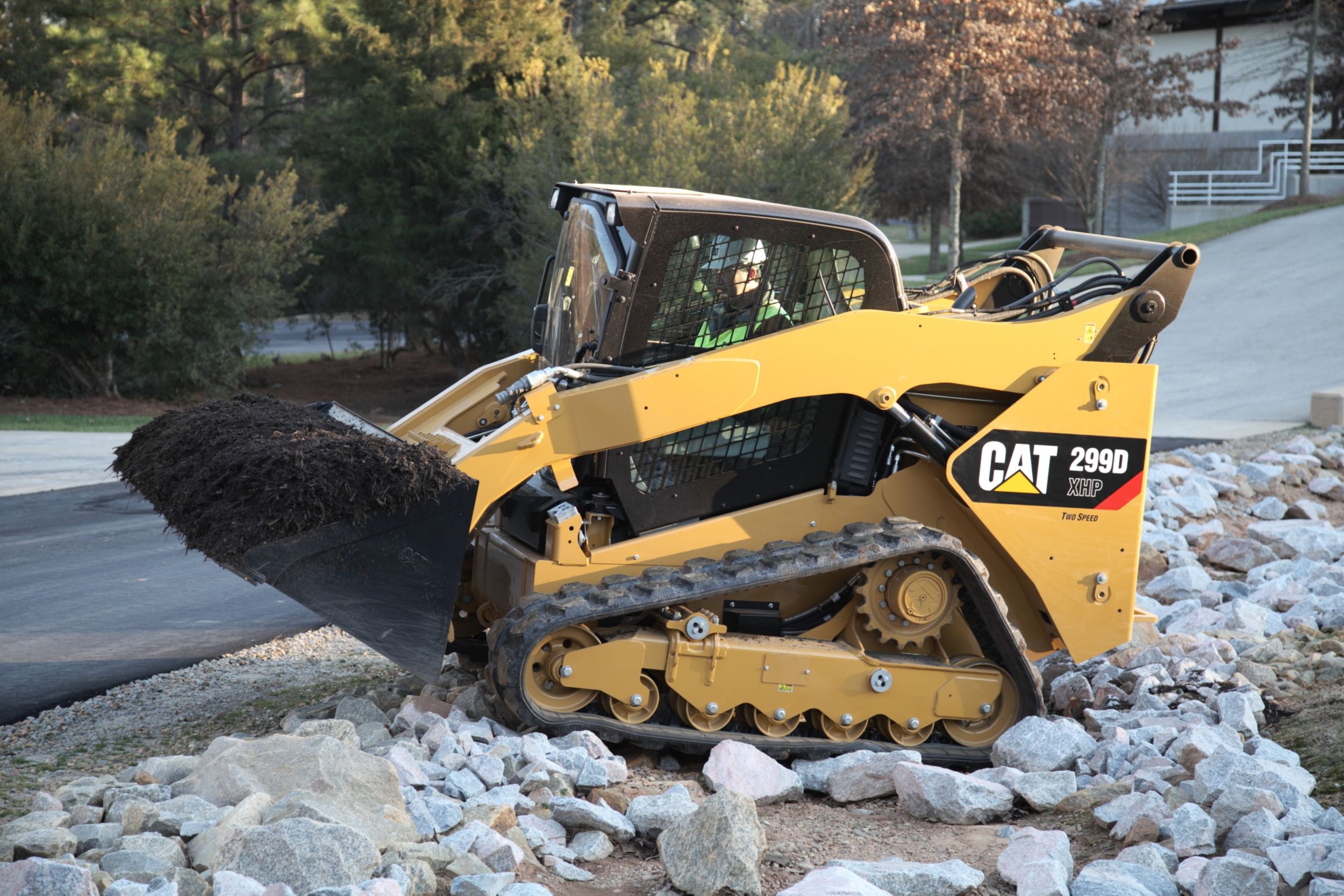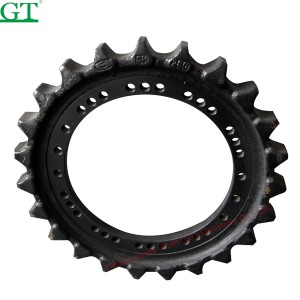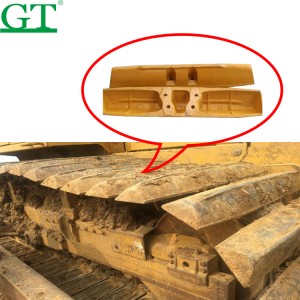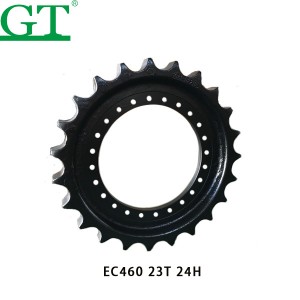CATERPILLAR COMPACT TRACK LOADER(CTL)Undercarriage Parts Track Roller Carrier Roller Sprocket
Skid Steer Tracks Undercarriage Description
- Pitch: The distance from the center of one embed to the center of the next embed. The pitch, multiplied by the number of embeds, will equal the total circumference of the rubber track.
- Sprocket: The sprocket is the gear of the machine, usually powered by a hydraulic drive motor, that engages the embeds to propel the machine.
- Tread Pattern: The shape and style of tread on the rubber track. The tread pattern is the portion of the rubber track which comes in contact with the ground. A rubber track’s tread pattern is sometimes referred to as lugs.
- Idler: That portion of the machine which comes in contact with the rubber track to apply pressure to keep the rubber track properly tensioned for operation.
- Roller: The part of the machine which comes in contact with the running surface of the rubber track. The roller supports the weight of the machine on the rubber track. The more rollers a machine has, the more the weight of the machine can be distributed over the rubber track, lowering the overall ground pressure of the machine.
Undercarriage Maintenance:
Below are maintenance practices that can help reduce wear:
- Maintain Proper Track Tension or Track Sag:
- Correct tension on smaller rubber track machines is about ¾” to 1”.
- Correct tension on larger rubber track machines can be as much as 2”.
- Track width
Track Tension and Track Sag
The most important, controllable factor in undercarriage wear is correct track tension or sag. Correct track sag for all smaller mini excavator rubber track units is 1” (+ or - ¼”). Tight tracks can increase wear up to 50%. On large rubber-tracked crawlers in the range of 80 horsepower, a ½” track sag results in 5,600 pounds of track chain tension when measured at the track adjuster. The same machine with the suggested track sag results in 800 pounds of track chain tension when measured at the track adjuster. A tight track magnifies the load and puts more wear on the link and sprocket tooth contact. Increased wear also occurs at the track-link to idler contact point and track-link to roller contact points. More load means more wear on the entire undercarriage system.
Also, a tight track requires more horsepower and more fuel to do the job.
Follow these steps to adjust track tension:
- Move the machine forward, slowly.
- Let the machine roll to a stop.
- A track link must be centered over the carrier roller.
- Put a straight edge over the track from the carrier roller to the idler wheel.
- Measure the sag at the lowest point.
Track Width
Track width makes a difference. Select the narrowest tracks possible for your machine. The O.E.M. provided track for your machine has been chosen because it optimizes that particular machine’s performance. Make sure the track gives the flotation needed.
Wide tracks used on hard surfaces will put an increased load on the track link system and can affect link retention in the rubber track. A wider than necessary track also increases stress and loads on the idlers, rollers, and sprockets. The wider the track and the harder the under-track surface, the faster the track treads, links, rollers, idlers and sprockets will wear.
Slopes
When working uphill on a slope, the weight of the equipment shifts to the rear. This weight translates to increased load on rear rollers as well as an increase in wear of track link and sprocket teeth on the forward drive side. While reversing down the hill, there will be some load on the undercarriage.
The reverse is the case when working downhill. This time, the weight shifts to the front of the machine. This affects components like the track links, roller and idler tread surface as the extra load is placed on them.
Reversing up the hill causes the track link to rotate against the reverse-drive side of the sprocket tooth. There is also extra load and movement between the track link and the sprocket teeth. This expedites track wear. All links from the bottom of the front idler to the first link contacted by the sprocket teeth are under heavy load. Additional weight is also placed between the track links and the sprocket teeth and the idler tread surface. The work life of undercarriage parts like the sprockets, links, idlers and rollers, is decreased.
When operating the machine on a side hill or on a slope, weight shifts to the downhill side of the equipment which results in more wear on parts like the roller flanges, track tread and sides of the track links. Always change the working direction on an incline or slope to keep wear balanced between the sides of the undercarriage.
Skid Steer Tracks Undercarriage Model
| Model | Equipment | Specs. | Engine -HP |
Bottom Roller OEM# |
Front Idler OEM# |
Rear Idler OEM# |
Drive Sprocket OEM# |
| 239D3 | CTL | Radial | 67.1 | 420-9801 | 420-9803 535-3554 |
420-9805 536-3553 |
304-1870 |
| 249D3 | CTL | Vertical | 67.1 | 420-9801 | 420-9803 535-3554 |
420-9805 536-3553 |
304-1870 |
| 259B3 | CTL | 304-1890 389-7624 |
304-1878 536-3551 |
304-1894 348-9647 TF 536-3552 TF |
304-1870 | ||
| 259D | CTL | 304-1890 389-7624 |
304-1878 536-3551 |
304-1894 | |||
| 259D3 | CTL | Vertical | 74.3 | 348-9647 TF 536-3552 TF |
|||
| 279C | CTL | 304-1890 389-7624 |
304-1878 536-3551 |
304-1894 348-9647 TF 536-3552 TF |
304-1916 | ||
| 279C2 | CTL | 304-1890 389-7624 |
348-9647 TF 536-3552 TF |
304-1916 | |||
| 279D | CTL | 304-1890 389-7624 |
304-1878 536-3551 |
304-1894 348-9647 TF 536-3552 TF |
304-1916 | ||
| 279D3 | CTL | Radial | 74.3 | 304-1916 | |||
| 289C | CTL | 304-1890 389-7624 |
304-1878 536-3551 |
304-1894 348-9647 TF 536-3552 TF |
304-1916 | ||
| 289C2 | CTL | 304-1890 389-7624 |
348-9647 TF 536-3552 TF |
304-1916 | |||
| 289D | CTL | 304-1890 389-7624 |
348-9647 TF 536-3552 TF |
304-1916 | |||
| 289D3 | CTL | Vertical | 74.3 | 304-1916 | |||
| 299C | CTL | 304-1890 389-7624 |
304-1878 536-3551 |
304-1894 348-9647 TF 536-3552 TF |
304-1916 | ||
| 299D | CTL | 304-1890 389-7624 |
304-1878 536-3551 |
348-9647 TF 536-3552 TF |
304-1916 | ||
| 299D2 | CTL | 348-9647 TF 536-3552 TF |
304-1916 | ||||
| 299D3 | CTL | Vertical | 98 | 304-1916 | |||
| 299D3 XE | CTL | Vertical | 110 | 304-1916 | |||
| 299D3 XE | CTL | Vertical Land Management |
110 | 304-1916 |




